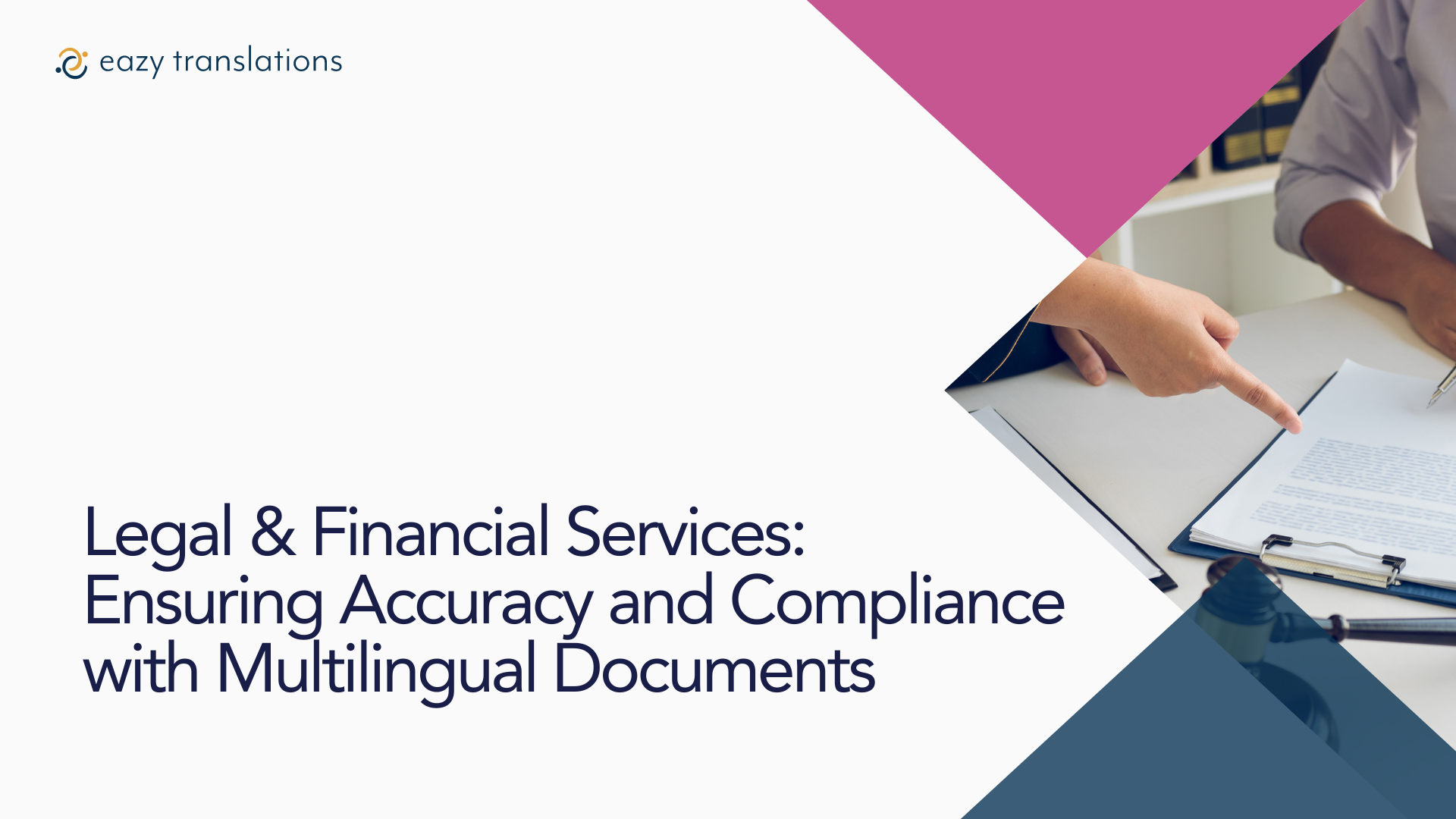The global marketplace has opened up new doors for legal and financial services providers. However, the intricacies of international transactions require careful attention to detail, especially when it comes to multilingual documents. Poor or inaccurate translations can have serious legal and financial consequences. In this article, we will look at the essential role of LTS in ensuring the accuracy and compliance of legal and financial documents.
Contents
- 1 Why Do Legal & Financial Services Need Language Translation Services?
- 2 What Makes Language Translation Services Critical for Legal & Financial Documents?
- 3 Finding the Right Language Translation Service Provider:
- 4 Best Practices for Working with Language Translation Services
- 5 The Future of Language Translation Services in Legal & Financial Services
- 6 Here are some key trends to watch in the future of Language Translation Services for the legal and financial sector:
- 7 The Bottom Line:
- 8 Here are some additional considerations for legal and financial service providers:
Why Do Legal & Financial Services Need Language Translation Services?
The legal and financial sectors operate on a foundation of precision and clarity. When dealing with international clientele or conducting business across borders, accurate and compliant translations are paramount. Here’s why Language Translation Services are essential:
- Mitigating Risk: Mistranslated contracts, agreements, or financial statements can lead to costly legal disputes, financial losses, and reputational damage. LTS providers ensure translations are accurate and reflect the nuances of legal and financial terminology.
- Ensuring Compliance: Financial regulations and legal frameworks vary significantly between countries. LTS providers with expertise in legal and financial translation can ensure documents comply with relevant regulations in the target language.
- Facilitating Clear Communication: Clearly translated documents promote better understanding between parties. This minimizes the risk of misunderstandings that could lead to delays, disputes, or missed opportunities.
- Building Trust & Credibility: Professional translations demonstrate your commitment to professionalism and respect for international clients. This fosters trust and strengthens your position in the global marketplace.
Imagine a law firm representing a client in an international business deal. The contract negotiations involve complex legal language and financial terms. Relying on an in-house staff member with basic language skills or free online translation tools could lead to disastrous consequences. A mistranslated clause could alter the terms of the agreement, leading to legal action. Investing in professional Language Translation Services ensures accuracy, protects all parties involved, and facilitates a successful transaction.
What Makes Language Translation Services Critical for Legal & Financial Documents?
Beyond basic translation accuracy, LTS providers offer specific advantages for the legal and financial sector:
- Subject Matter Expertise: Legal and financial translators possess in-depth knowledge of relevant terminology and nuances across languages.
- Cultural Awareness: Understanding cultural differences in legal and financial practices is crucial for accurate and culturally appropriate translations.
- Confidentiality and Security: LTS providers adhere to strict data security protocols to safeguard sensitive legal and financial information.
- Project Management Expertise: LTS companies manage complex translation projects efficiently, ensuring timely delivery and seamless integration with existing workflows.
Finding the Right Language Translation Service Provider:
Selecting the right LTS provider for your legal and financial needs requires careful evaluation. Here are some key considerations:
- Experience: Choose a provider with a proven track record of success in the legal and financial translation sector.
- Qualifications: Ensure translators possess relevant qualifications and certifications in legal and financial translation.
- Security Measures: Verify that the provider prioritizes data security and adheres to industry best practices for information protection.
- Project Management: Select a provider with a robust project management system to ensure smooth communication and timely completion of projects.
- Cost and Value: While cost is a factor, consider the value proposition. Choose a provider that offers competitive rates while delivering high-quality, accurate translations.
Best Practices for Working with Language Translation Services
To ensure a seamless experience with Language Translation Services, follow these best practices:
- Provide Clear Instructions: Clearly outline your document requirements, including the target audience, purpose of the translation, and desired tone.
- Glossary of Terms: Provide a glossary of specific legal and financial terms to ensure consistency in the translation.
- Formatting Requirements: Specify any formatting requirements for the translated document to ensure a polished final product.
- Quality Assurance: Establish a quality assurance process to review the translated documents for accuracy and adherence to your specifications.
- Ongoing Communication: Maintain open communication with your LTS provider throughout the project to address any questions or concerns.
By fostering a collaborative partnership with your Language Translation Services provider, you can ensure that your legal and financial documents are translated accurately, compliantly, and effectively.
The Future of Language Translation Services in Legal & Financial Services
Artificial intelligence (AI) and machine translation are changing the Language Translation Services (LTS) area. However, human expertise is still necessary for legal and financial translation, particularly for complex documents that require cultural sensitivity and nuanced understanding. The future of LTS is likely to combine human expertise with machine translation technology. LTS providers will use advanced tools to improve efficiency and reduce costs, but human translators will still provide critical oversight
necessary for ensuring accuracy, compliance, and cultural appropriateness in legal and financial translations.
Here are some key trends to watch in the future of Language Translation Services for the legal and financial sector:
- Machine Translation Integration: LTS providers will increasingly utilize machine translation tools for repetitive tasks, such as translating standard clauses or terminology lists. This will free up human translators to focus on high-complexity documents requiring their expertise.
- Enhanced Security Protocols: As the volume of sensitive legal and financial data increases, LTS providers will continue to develop and implement even more rigorous security measures to safeguard client information.
- Focus on User Experience: Technology will facilitate more user-friendly platforms for legal and financial professionals to submit translation requests, track project progress, and access translated documents.
- Specialization and Niche Expertise: The demand for specialized legal and financial translation services will continue to grow. LTS providers are likely to develop niche offerings catering to specific legal and financial sub-sectors like tax law, intellectual property, or mergers and acquisitions.
The Bottom Line:
In an increasingly interconnected world, Language Translation Services are no longer a luxury, but a necessity for legal and financial institutions operating internationally. By leveraging the expertise of qualified Language Translation Services providers, you can ensure that your documents are translated accurately, compliantly, and effectively, fostering trust with international clients and propelling your business towards global success.
Here are some additional considerations for legal and financial service providers:
- Developing In-House Translation Resources: While relying on external Language Translation Services is crucial, some legal and financial institutions may benefit from developing a small in-house team of translators with basic language skills to handle routine tasks or internal communication.
- Staying Informed about Regulatory Changes: As legal and financial regulations evolve globally, staying updated on relevant changes and their implications for translated documents is essential. Partnering with an LTS provider with expertise in navigating these complexities can be highly beneficial.
- Continuous Improvement: Regularly review your language translation processes and seek feedback from internal stakeholders and international clients to identify areas for improvement.
By adopting a proactive approach and fostering a strong partnership with a reputable Language Translation Services provider, legal and financial institutions can effectively bridge the language gap, ensure compliance with international regulations, and build a solid foundation for success in the global marketplace.





